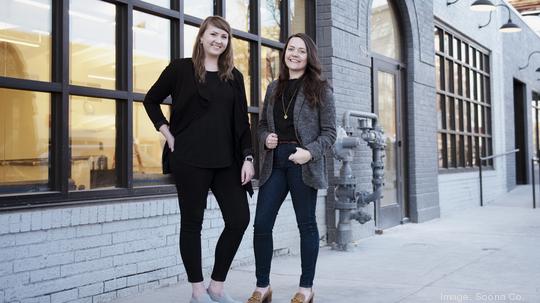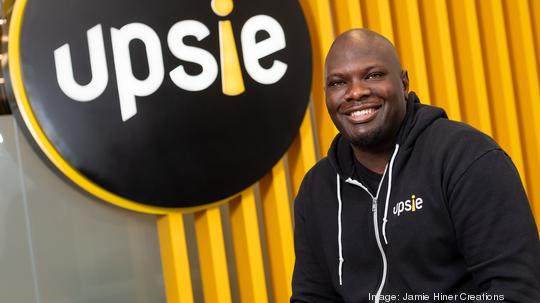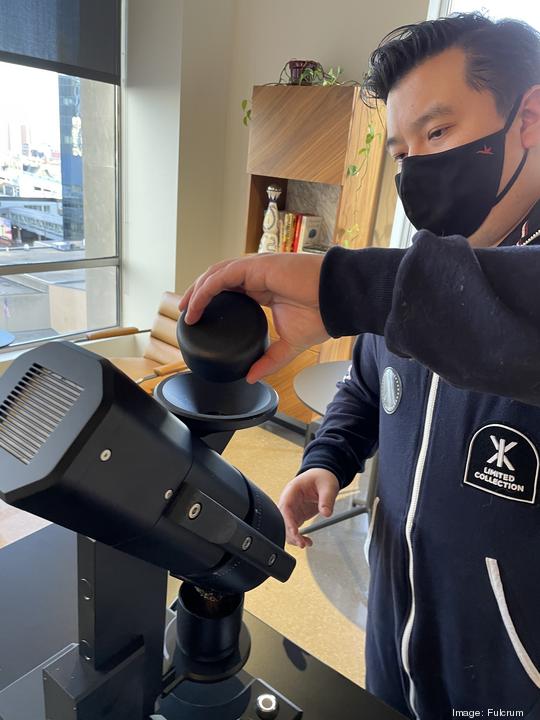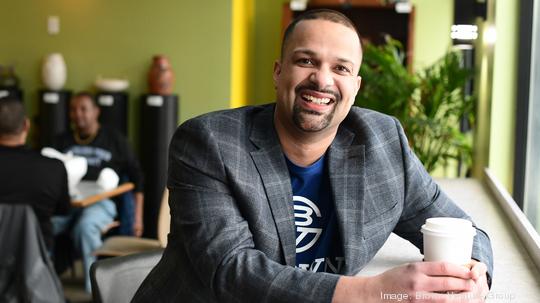After honoring 50 companies as Inno on Fire honorees, Minne Inno — the Business Journal’s news outlet focused on the startup scene — presents this year’s Blazer Award winners. The Blazer winners were selected from the 50 Fire honorees by a panel of judges who chose one company from each category that is lighting its industry on fire. The Startup of the Year category was too close to call, so two companies shared the honor.
Startup of the Year:
Soona
Soona, a startup that takes product photos for e-commerce companies, didn’t lose any of the momentum it had built up prior to the pandemic.
Rather than sputter out, the pandemic actually accelerated the Minneapolis-based company's growth.
Every business had to adapt in the past year, but instead of changing to survive, Soona accelerated its customer-experience vision by five years.
Co-founder and CEO Liz Giorgi said the company's original business plan was to move away from physical studios and embrace virtual photo shoots with clients participating in a shoot remotely through their device. It would be a years-long process, everyone thought. The pandemic changed the math.
“We embraced the opportunity to say, 'Can we actually accelerate this business to where we want it to be in 2025 or 2026, in 2020?' ” Giorgi said. “That is exactly what we did.”

Now clients can ship their products to one of Soona's studios in Minneapolis, Denver or Austin, and direct the shoot from their laptop.
A year ago, Soona was running 25 photo shoots per day. By year's end, that number will be at 125 photo shoots per day.
As the company continues to scale, Giorgi believes Soona has the ability to be an essential part of e-commerce going forward.
“I truly can see a future where there's absolutely nothing that you purchase on the internet that isn't shot at a Soona facility,” she said. “To me, that's a really compelling reason to keep going. We want to keep making the internet more beautiful through that process."
Upsie
Upsie was poised to grow when consumers flocked to big box retailers to upgrade their technology in order to work and learn from home more efficiently during the pandemic.
“The move to work-from-home was a huge moment for us,” said Founder and CEO Clarence Bethea. “It forced people who didn’t necessarily have the latest and greatest at home to upgrade.”

That opportunity led the Minneapolis-based warranty company to raise an $18.2 million round of venture capital in May, which will mainly go towards marketing.
Bethea is excited about the opportunity to serve more and more people as Upsie’s footprint grows. But rather than plan too far into the future, Bethea said he’s committed to serving the company’s customers.
“We try to stay away from long-term thinking and live in the moment with our customers and really focus on serving them,” he said.
Growing Company:
Fulcrum
Fulcrum, a Minneapolis-based company that builds software for manufacturing companies, capitalized on numerous opportunities presented by the pandemic.
Virtual meetings allowed CEO Sunny Han to stay in place while raising capital, rather than flying around the country. Han said he was able to meet with 25 investors in 30 days en route to raising $3 million in seed funding last fall.
Hiring also got a lift from trends spurred by the pandemic. When people started moving away from Silicon Valley, Fulcrum was able to hire people it wouldn’t normally have access to, Han said.
As Fulcrum gains traction, Han is committed to keeping the company’s headcount growing on the product side, before jumping to expand the sales department.
“We want to continue to invest in engineering, design and product management,” he said. “The product is huge and spans a massive amount of features and functionality.”
Fulcrum is now on a path to grow from 43 employees to 100 by this time next year. That rate of growth makes Han excited, but also a little fearful.
“It feels kind of like graduating high school a little bit,” he said. “There’s this big unknown that we're going into.”

Community Builder:
Beta.MN
Beta.MN Executive Director Casey Shultz said this last year was all about being nimble and reactive.
The Minneapolis-based support organization for startups had to ensure there were contingency plans for its programs which includes Twin Cities Startup Week and a twice-a-year accelerator for local startups.
“We learned so much from that experience,” she said. “Now we have the tools and experience needed to take our events hybrid, which allows us to reach a larger audience.”
Shultz said the organization’s partners, which included Target Corp., J.P. Morgan Chase and Cargill Inc., ensured Beta not only survived the year, but thrived.
Following Twin Cities Startup Week in September, Shultz is planning to take a step back in order to re-envision how Beta can not only help early-stage entrepreneurs, but the entire entrepreneurship community.
“Entrepreneurship is a lot of work, but it’s very rewarding,” she said. “If we can inspire more entrepreneurs than we’re doing our job.”
Social Impact:
Brown Venture Group
Brown Venture Group, a Minneapolis-based venture capital firm, was founded in 2018 with an emphasis on investing in Black-, Latino- and Native American-owned startups.
Now the firm is expecting to close on its inaugural $50 million fund by the end of the year. Co-founder and CEO Paul Campbell said Brown Venture is predicated on the huge upside potential of a market that has overlooked startups led by people of color and other underrepresented groups.
“There’s a pent-up demand as a result of existing practices, but they’re not necessarily the best practices,” he said.

Co-founder Chris Brooks said Brown Venture Group wants the Twin Cities community to realize that disruption, when done correctly, is a good thing.
“We’re not working with a fixed pie,” Brooks said. “We’re working with an expanding pie.”
Campbell added that’s a challenging message to get across to an often risk-averse Twin Cities business community.
“All existing large companies in the Twin Cities were disrupting large businesses,” he said. “We just want to see more opportunity, more human flourishing.”
High Tech Company
NetSPI
NetSPI doubled down on talent and grew its team over the past year.
Earlier this summer, the Minneapolis-based cybersecurity firm added a ransomware attack simulation, in addition to its portfolio of penetration testing services.
“It was a good time for us, because we were already in the middle of disrupting an already stale industry,” Shilts said. “We moved fast, we over communicated, but more than anything, we just focused on taking care of our customers.”
Moving forward, NetSPI has plans to keep disrupting the industry without compromising quality.
“Cyber is still fast moving and very innovative, but when you’re really a disruptor and changing the way people consume a service, that gets everybody excited,” Shilts said.
Education:
7 Generation Games
7 Generation Games had a busy year, but that chaos came with heaps of growth.
The educational video game developer doubled its users in the past year, brought on 200 new teachers since January, and is averaging more than 50 new classrooms per month.
CEO and Creative Director Maria Burns Ortiz said the company’s success isn’t just predicated on getting games into classrooms, but generating outcomes.
Its games, which focus on serving students from Native American, Latino and underserved rural communities, have been shown to improve math skills over 300% from a control group.
The company is now piloting a platform that will lower the barrier to game development by allowing more content to be created.
“We found there was a lot of great content and curriculum,” Burns Ortiz said. “But getting both expertise is expensive.”
Burns Ortiz said everyone on the small team truly believes in what they’re doing, even if they don’t pay the most “out-there wages.”
“The things we’re doing are not just creating cool tech, but helping kids and creating a better world,” she said.
Health and Wellness Company:
Nightware
Minneapolis-based Nightware has developed a technology to treat PTSD-caused nightmares through an Apple Watch.
But last year, the company hit a crossroads when it was 30% of the way through its clinical trial when the FDA put a moratorium on trials during the pandemic.
“We were faced with a really tough decision,” said CEO Grady Hannah, “Do we just sit here and keep burning money and not really be able to go to the market, or do we take a risk.”
The riskier route paid off. In April, Nightware filed to receive breakthrough status from the FDA, which is granted when a new treatment meets a life-threatening condition that has an unmet treatment need.
Nighware’s technology, which monitors heart rate and body movements to interrupt nightmares with vibrations, was awarded breakthrough status in November. That approval allowed the company to launch with the Veteran’s Administration and the Department of Defense, due to its high concentration of patients in need.
Medical Device Company:
ShiraTronics
ShiraTronics purposely keeps a low profile. Since the Brooklyn Park-based startup didn’t respond to interview requests, we can only go off what it’s released publicly.
As of last year, ShiraTronics said it was focused on treating migraine headaches by developing and clinically testing neuromodulation technology, which uses electrical current to alter nerves.
The company was spun off from NuXcel, a medical device accelerator.
In March 2020, ShiraTronics raised $36 million in Series A funding led by San Francisco-based Breakout Ventures.







